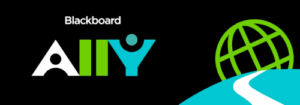Thursday 19th May saw the 11th Global Accessibility Awareness Day (GAAD) designed to “get everyone talking, thinking and learning about digital access and inclusion, and the more than one billion people with disabilities/impairments.” (GAAD, 2022)
Recognizing that that we have a diverse range of students with different learning needs, styles and preferences, and who engage with their learning and resources in different ways, we celebrated GAAD this year by offering a staff development programme to help colleagues provide accessible resources to all students and to share some of the good practice going on at the university. We noted that around 20% of our student body has declared a mental or physical disability or particular challenge, highlighting our need to ensure we provide an inclusive learning experience accessible to all our students with their varying circumstances. Also noted was the importance in providing digitally accessible materials for our staff too. The GAAD programme comprised the following sessions:
- TEL: Digital Accessibility and Inclusion in T&L at UoR
- TEL: Inclusive Design Principles for Online T&L
- TEL: Making Your Blackboard Module More Accessible using the Blackboard Ally tool
- TEL Showcase: Accessible Notation in STEM Subjects
Professor Clare Furneaux (Accessibility Lead) kicked off the event by sharing the importance of providing digitally accessible resources for all our students, the work being undertaken by the Accessibility Working Group and the draft Digital Accessibility Policy. (She’d welcome feedback so please do email her ASAP with any thoughts.) Dr Sam Bizley (Pharmacy) shared the work he’s doing as part of his EDMAP3 on the accessibility of online learning materials for MPharm students. Lottie Wigmore (Henley Business School, HBS) presented what she and her colleagues in the Learning Innovation & Development (LID) Hub have been doing to help improve the accessibility of online learning materials in HBS.
TEL colleagues and Annabel Avery (Disability Advisory Service) delivered TEL’s accessibility staff development sessions discussing the principles for designing inclusive T&L and accessible resources, and examining how staff can use Blackboard’s Ally tool to check and improve the accessibility of resources they make available on Blackboard and which offers students a range of different formats in which they can download and access content. TEL will be offering this pair of sessions in future staff development so please look out for details in the fortnightly CQSD T&L Programme email.
TEL Advisor, Matt Jones, also facilitated a showcase to share what colleagues in STEM subjects have been working on to provide digitally accessible notation to students in Maths and Computer Science. We were delighted that Calvin Smith, Pete Sweby, Jeroen Wouters and Richard Mitchell and were able to share their practice and solutions. Matt is looking to set up a special interest group to look at the accessibility of notation so if you’re interested, he’d love to hear from you: m.a.jones@reading.ac.uk
Staff can find out more about how they can use Blackboard Ally to improve the accessibility of their Blackboard content on the Staff Support site. Students can learn more about the different formats available for download on Blackboard on the Student Support site.
You may also find the Accessible Resources guidance on the TEL website helpful. Find out about the principles for inclusive design to help you design your Blackboard module for all of your students and the SCULPT Framework to help you design accessible learning resources.
More blog posts will follow over the next few weeks to provide a bit more detail about each of the sessions and to share good practice, tips and advice to help us all provide an inclusive and accessible experience for everyone here at Reading.
References:
- Bale, R. and Seabrook, M., 2021. Introduction to University Teaching. London: SAGE, pp.145-163.
- GAAD. 2022. GAAD. [online] Available at: <https://accessibility.day/> [Accessed 10 May 2022].


